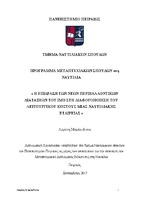Η επίδραση των νέων περιβαλλοντικών διατάξεων του ΙΜΟ στην διαφοροποίηση του λειτουργικού κόστους μιας ναυτιλιακής εταιρείας

Προβολή/
Λέξεις κλειδιά
IMO ; Ασφάλεια στην ναυτιλία ; Ποιοτικός έλεγχος ; Ναυτιλιακές εταιρείες ; Κώδικας ISMΠερίληψη
Η παρούσα διπλωματική εργασία πραγματεύεται τη συνεισφορά των υποχρεωτικών
διατάξεων του ΙΜΟ για την ασφάλεια στη θάλασσα και την πρόληψη της ρύπανσης στην
ποιοτική διαχείριση των ναυτιλιακών επιχειρήσεων. Θα γίνει ανάλυση των διατάξεων του
ΙΜΟ, με εστίαση στο περιβαλλοντικό κομμάτι και η επίδραση αυτών στο λειτουργικό κόστος
μιας ναυτιλιακής εταιρείας.
Η μείωση των ναυτικών ατυχημάτων είναι βασικός σκοπός του ΙΜΟ, ο οποίος λειτουργεί
σε συνεργασία με τις Κυβερνήσεις στο πεδίο των κανονισμών και πρακτικών που σχετίζονται
με κάθε είδους τεχνικά θέματα που επηρεάζουν τη ναυτιλία διεθνώς.
Επίσης η ενθάρρυνση υιοθέτησης υψηλότερων προτύπων σε θέματα ασφάλειας και
αποδοτικότητας της ναυσιπλοΐας καθώς και η πρόληψη της ρύπανσης αλλά και η αποζημίωση
από ναυτικές απαιτήσεις αποτελούν σκοπούς του ΙΜΟ.
Το διεθνές αυτό πρότυπο διαχείρισης υιοθετήθηκε από τον Διεθνή Ναυτιλιακό
Οργανισμό ( International Maritime Organization ) το Νοέμβριο του 1993 για να εισαγάγουν
την σπουδαιότητα του ανθρώπινου παράγοντα στους κανονισμούς ασφαλείας και εμπορικών
πλοίων διεθνώς, περιλαμβάνοντας απαιτήσεις για τις διαχειρίστριες εταιρίες τους.
Η απόφαση για την υποχρεωτική εφαρμογή του κώδικα ΙSM καθώς και πολλών άλλων
κανονισμών, προκάλεσε μεγάλη αναστάτωση σε όλους τους φορείς που εμπλέκονται: στις
διοικήσεις σημαιών, στις ασφαλιστικές ενώσεις, στις ίδιες τις ναυτιλιακές εταιρίες κλπ.
Αποφάσισα λοιπόν να ασχοληθώ με την ασφάλεια στη θάλασσα μέσω των διατάξεων
του IMO δεδομένου ότι αποτελεί ένα παγκοσμίως σημαντικό μέτρο για την αντιμετώπιση
ναυτικών ατυχημάτων και για την ασφάλεια της ανθρώπινης ζωής στη θάλασσα. Σημασία θα
δοθεί στην εκτενή ανάλυση του ISM, του ISPS καθώς και άλλων συναφών με το θέμα
διατάξεων, όπως STCW, MARPOL, SOLAS καθώς και ανάλογων “conventions” αντίστοιχων
του ΙΜΟ διεθνών οργανισμών όπως το ILO (MLC) κλπ.
Ερωτήματα που καλούνται να απαντηθούν είναι πως οι παραπάνω διατάξεις λειτουργούν
στην πράξη και πώς θα πρέπει να εφαρμόζονται από τις ναυτιλιακές εταιρείες; Οι μέθοδοι που
εν τέλει ακολουθούνται είναι αποτελεσματικές; Και τέλος, κατά πόσο αυτές οι διατάξεις
επηρεάζουν το λειτουργικό κόστος των εταιρειών;


